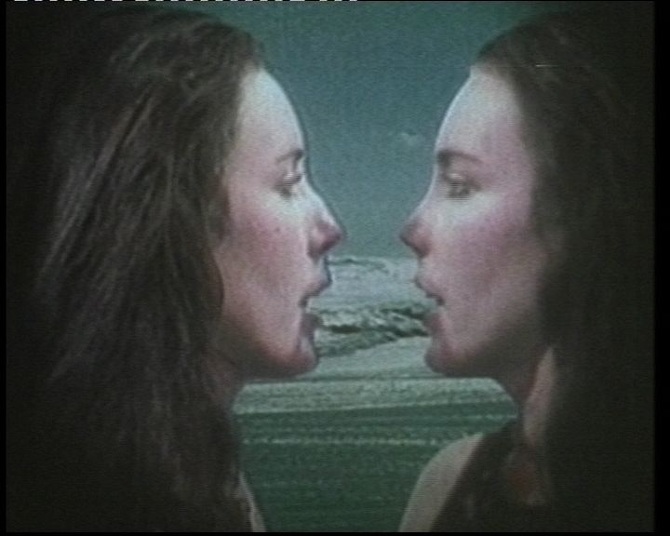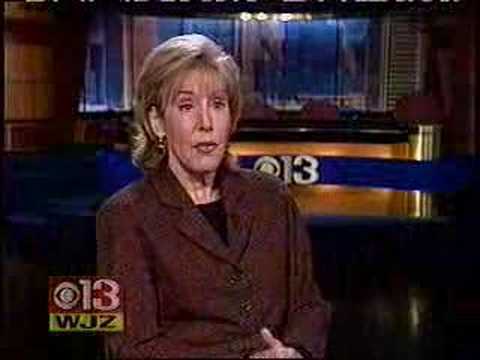by Tom Warner (Baltimore Or Less)
Last Saturday, the Enoch Pratt Free Library partnered with the local experimental cinema group Sight Unseen to screen an hour-long program of eight experimental shorts selected from the Central Library’s celebrated collection of over 2,100 16mm films. The program, entitled “Sight Unseen: Sights & Sounds from Enoch Pratt,” was curated by Lorenzo Gattorna and Kate Ewald, whose collective’s aim is to “engage diverse communities and distinguished venues with the prominence and potential of the moving image.”
It was a great program that succeeded on both counts – hardcore cineastes like curator Herb Shellenberger of International House came down from as far away as Philadelphia, while Pratt’s “diverse” community of non-cineaste “regulars” (i.e., the homeless, the mentally ill, and the otherwise disenfranchised who just like to sit down or sleep in a darkened room for a spell) – were engaged by what Sight Unseen’s program notes described as “audiovisual displays of unbridled cinepoems, contrast-filled fantasies, televised filmloops, violent diptychs, laboratory graphics, plein air dreamscapes, paranoid studies and multiplied microcosms.”
It was quite an unusual audience mix, but fascinating to observe, all the same. While the cineastas drooled at seeing rare works by Scott Bartlett (Off-On), Aldo Tambellini (Black TV), Derek May (Angel, which not only featured music by Leonard Cohen but also an uncredited performance by same), Lillian Schwartz (UFOs), Jacques Drouin (a pristine print of the gorgeously animated Mindscape), Denys Columb de Daunant (the beautiful visual tone poem Dream of the Wild Horses), and former Baltimore-based artist-musician-filmmaker-neoist Michael Tolson, better known as tENTATIVELY a cONVENIENCE (Subtitles), others were not as impressed. One audience member, who slept through most of the screening, later handed in a comment card that could double for an indictment of experimental cinema itself: “Dislike. Noise + flashing lights.”
But the film that most impressed me was Mirrored Reason, a 1979 short by experimental film legend Stan Vanderbeek, who ran UMBC‘s visual arts program until his death in 1984. This Kafka-inspired, Gogol-esque study in paranoia about a young woman’s vision of herself being replaced by another woman employed split screen technology and background optical printing for what was basically a nine-minute monologue by a lone actress. I figured the actress was just a friend or student of the filmmaker, but a light in my head went off when I saw the end credits listing the actress as none other than…“Denise Koch“! Who knew?
Yes, our own Eyewitness News co-anchor, who for over 30 years has reported on news, sports (remember “Daring Denise” on Evening Magazine?) and, naturally, the arts for WJZ-13 TV. I say naturally because before she became a newscaster, the UCLA and California Institute of the Arts graduate was heavily involved in theater (she graduated summa cum laude with a master’s degree in Theatre from the University of Michigan, Ann Arbor ) and the performing arts. Her early acting career landed her parts on the television soap opera Another World before she made her way to Baltimore’s Center Stage as a performer and literary manager.
Koch’s performance is outstanding and the film, while utilizing various optical techniques to suggest paranoia and confusion, is built around it. There are also a lot of extreme close-ups, which I found interesting after seeing this quote by her about being in the limelight: “I work full time as an anchor at WJZ TV on a night shift. I’ve got to meet three deadlines every day, all in front of a camera that shoots my face closer than the human eye was ever meant to see a face.”
Hey, after having Vanderbeek’s camera zoom in and out and every which way in Mirrored Reason, facing the teleprompters and WJZ-TV cameras must be a cakewalk! And didn’t the premise of Mirrored Reason – that a young woman’s identity is superseded by that of her double – parallel Koch’s own transition from theatrical actress to professional newscaster? (Not to mention her own identity crisis in 1995 when, following a difficult, life-threatening pregnancy and the emotional stress of watching friend and WJZ co-worker Al Sanders lose his battle against lung cancer, she was briefly treated for panic disorder and post-partum depression.) Ah fiction, the lie that tells the truth!
Vanderbeek was an underground film pioneer who embraced the newest technologies (video, computers, even fax machines) and was artist-in-residence at Bell Labs and at NASA’s film division before coming to Baltimore. Unfortunately, his films remain extremely hard to see, outside of a few online postings to YouTube (where one can see Breathdeath and Science Friction) and UbuWeb Film. Thankfully, the Enoch Pratt Central Library has four Vanderbeek classics: Breathdeath (Terry Gilliam cited it as an influence on his later work with Monty Python), Euclidean Illusions, Mirrored Reason, and Science Friction.
And Baltimore (and WJZ) has Denise Koch, the erstwile actress who passed through the looking glass of experimental film and theater production to emerge as an award-winning television news journalist and one of Baltimore’s most recognized and popular celebrities.
Related Links:
WJZ-TV Baltimore: Denise Koch 25th Anniversary Report (YouTube)
Denise Koch‘s Facebook page


